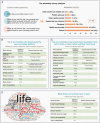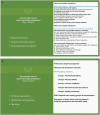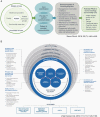Proceedings of the Survivorship Care in Neuro-Oncology Workshop sponsored by the Comprehensive Oncology Network Evaluating Rare CNS Tumors (NCI-CONNECT)
- PMID: 35542753
- PMCID: PMC9079897
- DOI: 10.1093/noajnl/vdac029
Proceedings of the Survivorship Care in Neuro-Oncology Workshop sponsored by the Comprehensive Oncology Network Evaluating Rare CNS Tumors (NCI-CONNECT)
Abstract
Background: Survivorship for those living with primary CNS cancers begins at diagnosis, continues throughout a person's life, and includes caregivers. Opportunities and challenges exist to advance survivorship care for those living with primary CNS cancers that necessitate stakeholder involvement.
Methods: In June 2021, NCI-CONNECT convened a two-day virtual workshop about survivorship care in neuro-oncology. Two expert panels provided key recommendations and five working groups considered critical questions to identify strengths, weaknesses, opportunities, and threats to the advancement of survivorship care and developed recommendations and action items.
Results: The following action items emanated from the workshop: seek endorsement of meeting report from stakeholder organizations; address barriers in access to survivorship care and provider reimbursement; advance survivorship research through NIH and private grant support; develop a survivorship tool kit for providers, people living with primary CNS cancers and their caregivers; provide accessible educational content for neuro-oncology, neurology, and oncology community providers about survivorship care in neuro-oncology; and establish core competencies for survivorship care for neuro-oncology providers to be included in training and standardized exams.
Conclusions: Action items aim to address access and reimbursement barriers, expand patient and provider education, develop core competencies, and support survivorship research through funding and other supports.
Keywords: NCI-CONNECT; patient-centered care; primary central nervous system cancer; survivorship; survivorship care.
Published by Oxford University Press on behalf of the Society for Neuro-Oncology and the European Association of Neuro-Oncology 2022.
Figures





References
-
- National Coalition for Cancer Survivorship: Our history. Available at https://canceradvocacy.org/about/our-history/. Accessed November 3, 2021.
-
- National Cancer Institute Office of Cancer Survivorship. Statistics, graphs and definitions. Available at https://cancercontrol.cancer.gov/ocs/statistics#definitions. Accessed November 3, 2021.
-
- Hewitt M, Greenfield S, Stovall E, et al. From cancer patient to cancer survivor: Lost in transition. Washington DC:National Academies Press; 2006. Available at https://canceradvocacy.org/wp-content/uploads/2013/01/From-Cancer-Patien.... Accessed on December 3, 2021.
